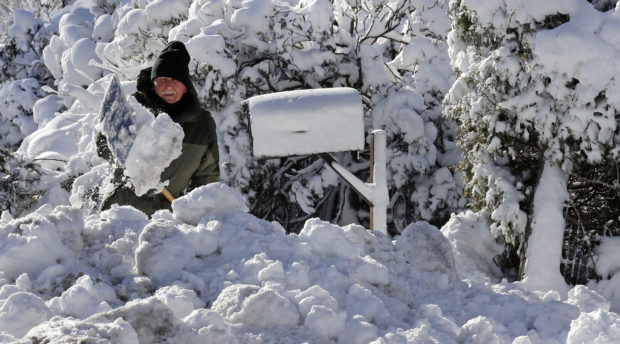
J.J. Laprise shovels his driveway in Scituate, Mass., Friday, Jan. 5, 2018. Frigid temperatures, some that could feel as cold as minus 30 degrees, moved across the East Coast on Friday as the region attempted to clean up from a massive winter storm. (AP Photo/Charles Krupa)
BOSTON — Frigid temperatures, some that felt as cold as minus 30 degrees, moved across the East Coast on Friday as the region dug out from a massive winter storm that brought more than a foot of snow, hurricane-force winds and coastal flooding a day earlier.
Forecasters predicted strong winds and record-breaking cold air to hang around through the weekend.
Jess Flarity, a 32-year-old visiting a friend in Concord, New Hampshire, said the deep chill reminded him of his time in Alaska.
“I’ve been in minus 60 before so minus 20 doesn’t frighten me,” he said as he waited for a bus back to Boston Friday. “But I did have to prepare, bring some extra cold weather gear — gloves, boots and those kinds of things.”
In Portland, Maine, Jeanne Paterak said the cold snap revived her worries about the impact of climate change. “We are seeing some historic temperatures and everyone will be vulnerable,” she said as she stocked up on milk, vegetables and juice at a supermarket Friday morning.
The arctic blast could make temperatures feel as low as minus 15 degrees to minus 25 from Philadelphia to Boston and make residents of states like Maryland and Virginia shiver from temperatures ranging from 10 degrees to 15 degrees. The wind chill could make it feel like minus 35 degrees in the Berkshire hills of western Massachusetts, the National Weather Service said.
Thursday’s storm packed wind gusts of more than 70 mph (113 kph) and dumped as much as 18 inches (46 centimeters) of snow in some places.
It caused school and business closings, airline and rail service cancellations or reductions and thousands of utilities outages, many of them restored quickly. Some ferry services also had to be shut down.
Flights resumed at airports along the East Coast after hundreds were canceled Thursday.
In New Jersey, gusty winds carried flames from a vacant building across the street to two other buildings Friday morning. The flames also spread to two structures adjacent to the vacant building, damaging a total of five in Newark. Two firefighters suffered minor injuries.
In the South, the winter weather forced portable toilets to be put in place outside Mississippi’s Capitol after pipes burst and it caused iguanas to become sluggish and topple from trees in South Florida. Residents of southeast Georgia were treated to a rare half foot of snow (15 centimeters).
In New England, powerful winds brought coastal flooding that reached historic levels in some communities.
The National Oceanic and Atmospheric Administration confirmed Friday that water levels in Boston broke the record set during a massive blizzard in 1978.
The flooding sent large trash containers floating down Boston streets, forced the shutdown of a subway station as water cascaded down the steps and prompted rescues of people trapped in cars and homes by rapidly rising waters in several Massachusetts communities.
In Scituate, south of Boston, residents were spending Friday trying to dry out their basements before more frigid temperatures arrived.
Longtime resident Dianne Davis said her home was completely surrounded by ocean water that eventually filled her basement.
“I’ve never been afraid, but when the water was coming up over my front steps, that’s when I said … ‘OK this is getting serious.'” said Davis.
At least eight people died in weather-related accidents, including a 13-year-old girl who was sickened by carbon monoxide in an apartment building in Perth Amboy, New Jersey.
In Massachusetts, a worker suffered cardiac arrest and died Friday while clearing snow at a Massachusetts Water Resources Authority facility. And in Maine, authorities on Friday said they’re still searching for a clammer who disappeared during the blizzard.
Sunday morning was expected to bring the coldest temperatures from Portland, Maine, to Washington, D.C. More seasonable weather is expected to return early next week with temperatures in the high 30s and near 40s.